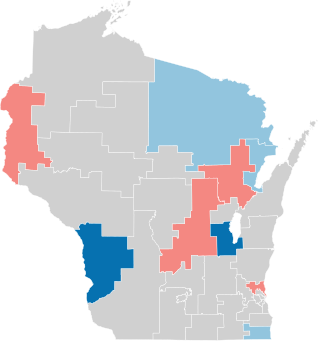Collective bargaining is a process of negotiation between employers and a group of employees aimed at agreements to regulate working salaries, working conditions, benefits, and other aspects of workers' compensation and rights for workers. The interests of the employees are commonly presented by representatives of a trade union to which the employees belong. A collective agreement reached by these negotiations functions as a labour contract between an employer and one or more unions, and typically establishes terms regarding wage scales, working hours, training, health and safety, overtime, grievance mechanisms, and rights to participate in workplace or company affairs. Such agreements can also include 'productivity bargaining' in which workers agree to changes to working practices in return for higher pay or greater job security.
In the context of labor law in the United States, the term right-to-work laws refers to state laws that prohibit union security agreements between employers and labor unions. Such agreements can be incorporated into union contracts to require employees who are not union members to contribute to the costs of union representation. Unlike the right to work definition as a human right in international law, U.S. right-to-work laws do not aim to provide a general guarantee of employment to people seeking work but rather guarantee an employee's right to refrain from being a member of a labor union.

The National Education Association (NEA) is the largest labor union in the United States. It represents public school teachers and other support personnel, faculty and staffers at colleges and universities, retired educators, and college students preparing to become teachers. The NEA has just under 3 million members and is headquartered in Washington, D.C. The NEA had a budget of more than $341 million for the 2012–2013 fiscal year. Becky Pringle is the NEA's current president.

Scott Kevin Walker is an American politician who served as the 45th governor of Wisconsin from 2011 to 2019. A member of the Republican Party, he previously served as Milwaukee County executive from 2002 to 2010.

Graduate student employee unionization, or academic student employee unionization, refers to labor unions that represent students who are employed by their college or university to teach classes, conduct research and perform clerical duties. As of 2014, there were at least 33 US graduate employee unions, 18 unrecognized unions in the United States, and 23 graduate employee unions in Canada. By 2019, it is estimated that there were 83,050 unionized student employees in certified bargaining units in the United States. As of 2023, there were at least 156 US graduate student employee unions and 23 graduate student employee unions in Canada.

The California School Employees Association (CSEA) is the largest classified school employees labor union in the United States. CSEA represents a quarter million classified public school employees in California.

The California Teachers Association (CTA) is a teachers' trade union based in the city of Burlingame, California. The association was initially established in 1863. It is regarded as one of the largest and most powerful teachers' unions in the state with over 300,000 members and a high political profile in California politics. The current president of the association is David B. Goldberg.
The Ohio Federation of Teachers (OFT) is a statewide federation of unions in Ohio, affiliated with the American Federation of Teachers (AFT), AFL–CIO.

The Oregon Education Association (OEA) stands as the largest public education employees' union in the U.S. state of Oregon, advocating for the interests of 44,000 teachers and classified personnel. With local affiliates established in each of the state's 199 public school districts and 8 community colleges, the OEA serves as the state affiliate of the National Education Association.
United Teachers of New Orleans (UTNO) is a labor union representing teachers and other educational workers in New Orleans, Louisiana, United States. It is an affiliate of the Louisiana Federation of Teachers (LFT), American Federation of Teachers (AFT) and the AFL-CIO.
Davenport v. Washington Education Association, 551 U.S. 177 (2007), is a ruling by the Supreme Court of the United States in which the Court held that it does not violate the First Amendment for a state to require its public-sector unions to receive affirmative authorization from a non-member before spending that nonmember's agency fees for election-related purposes.
Wisconsin Virtual Academy (WIVA) is a virtual school administered as a charter school by the McFarland School District in McFarland, Wisconsin. The school is operated by the for-profit K12 Inc. corporation of Virginia.
Communications Workers of America v. Beck, 487 U.S. 735 (1988), is a decision by the United States Supreme Court which held that, in a union security agreement, unions are authorized by statute to collect from non-members only those fees and dues necessary to perform its duties as a collective bargaining representative. The rights identified by the Court in Communications Workers of America v. Beck have since come to be known as "Beck rights", and defining what Beck rights are and how a union must fulfill its duties regarding them is an active area of modern United States labor law.
A public-sector trade union is a trade union which primarily represents the interests of employees within public sector or governmental organizations.

The 2011 Wisconsin protests were a series of demonstrations in the state of Wisconsin in the United States beginning in February involving as many as 100,000 protesters opposing the 2011 Wisconsin Act 10, also called the "Wisconsin Budget Repair bill." The protests centered on the Wisconsin State Capitol in Madison, with satellite protests also occurring at other municipalities throughout the state. Demonstrations took place at various college campuses, including the University of Wisconsin–Madison and the University of Wisconsin–Milwaukee. After the collective bargaining bill was upheld by the Wisconsin Supreme Court on June 14, the number of protesters declined to about 1,000 within a couple days.

In February 2011, a series of public employee protests began in the United States against proposed legislation which would weaken the power of labor unions. By March, eighteen states had proposed legislation which would remove some collective bargaining powers from unions, along with another five states which proposed legislation which would negatively affect unions. The protests occurred when public employee unions mounted protests against legislation proposed by Republican governors such as Scott Walker (Wisconsin), Rick Scott (Florida), Mitch Daniels (Indiana), Sean Parnell (Alaska), Rick Snyder (Michigan), John Kasich (Ohio), Paul LePage (Maine) and Jan Brewer (Arizona) which, among other things, would strip public employees of some collective bargaining rights as well as require higher employee contributions to pension and health care plans. The governors stated they needed these changes in order to cut state spending and balance the states' budgets. The protests began in Wisconsin, then spread to Indiana and Ohio, with unions around the country rallying to show their opposition to the proposed legislation. Several other states considered similar legislation. Virginia, North Carolina, and Texas prohibit formal collective bargaining with public employees.

2011 Wisconsin Act 10, also known as the Wisconsin Budget Repair Bill or the Wisconsin Budget Adjustment Act, is a controversial law enacted by the 100th Wisconsin Legislature which significantly limited the rights and compensation of state and local government employees in Wisconsin. It was the signature act of Republican governor Scott Walker, who described it as a tool needed to address a projected $3.6 billion budget deficit. The introduction of this bill provoked immediate outrage from labor unions and their allies, and resulted in months of mass protests at the Wisconsin State Capitol. Democratic members of the Wisconsin Senate then fled the state to deny a quorum for the bill, remaining in Illinois for three weeks. Republicans in the legislature eventually stripped out budgetary items to circumvent budget-related quorum rules and passed the legislation on March 9, 2011. The law was signed by governor Walker on the morning of March 11 and was followed by a ceremonial signing later that day.

Recall elections for nine Wisconsin state senators were held during the summer of 2011; one was held on July 19, and six on August 9, with two more held on August 16. Voters attempted to put 16 state senators up for recall, eight Democrats and eight Republicans, because of the budget bill proposed by Governor Scott Walker and circumstances surrounding it. Republicans targeted Democrats for leaving the state for three weeks to prevent the bill from receiving a vote, while Democrats targeted Republicans for voting to significantly limit public employee collective bargaining. Scholars could cite only three times in American history when more than one state legislator has been recalled at roughly the same time over the same issue.
The Putting Students First Act is an act passed by the Legislative Assembly of Ontario. The law allows the provincial government to set rules that local school boards must adhere to when negotiating with local unions and to impose a collective agreement on the board, employee bargaining agent, and the employees of the board represented by the employee bargaining agent if negotiations are not completed by December 31, 2012. This bill also limits the legality of teachers' unions and support staff going on strike. In April 2016, the law was found to be unconstitutional.
A public-sector trade union is a trade union which primarily represents the interests of employees within public sector or governmental organizations.










